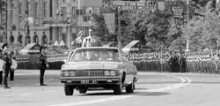Polls over the years show that an increasing number of Ukrainian citizens believe that the nation’s Independence Day is really something to celebrate, rather than just another officially granted day off. Even if this increment rate registers one or two percent, the fact remains. Naturally, whether or not our fellow countrymen feel like celebrating August 24 depends not only on the level of organization. However, the external aspect is also important. Judging by the latest reports submitted by our correspondents and experts of The Day, there is already a degree of positive experience. There is also a creative trend of development, meaning that this experience will be extended. Is it possible to say that a larger number of people believe that it is truly their holiday? And whether the formal aspects of the occasion — military parade, concerts, shows, etc. — are evidence of this attitude.
Yuri RYBCHYNSKY, composer:
I don’t know how this event was observed in small towns. It was a major event at the capital, as usual, but I was in Kharkiv at the time. There the whole thing was kept rather low key and it seemed to me that Victory Day remained the main holiday in most people’s consciousness. I also think that Ukraine will have to reach a certain level of economic progress to make August 24 more than yet another exercise in official pathos. If we could be at the level of the Baltic states, our people would be actually aware of the attainments made in twelve years of independence. Here most believe that they have lost something and have got nothing in its place. In terms of daily life, our people seem unable to realize that they are living a little bit better than before independence.
Prof. Yuri SHAPOVAL, Ph.D. in history:
In the first place, I would like to stress that I am personally fond of this holiday, I like it even though it’s not staged on a scope as broad as, say, its counterpart in the United States. I have visited that country in time to witness the event on several occasions. Of course, the range and quality in the US and Ukraine are quite different. In Ukraine, over the past couple of years, however, we have been witness to considerable progress in celebrating the date. I think that this holiday is uniting more people, and that for many it now serves as evidence that Ukraine not only exists, but also has a better future. Of course, those still capable of thinking in this country are well aware that we seem to have two kinds of independence, one meant for festive occasions and another experienced in daily life. My cherished dream (I am reminded of it every year on August 24) is to live to see these two different notions merge. Then we would all have a single holiday.
I’m somewhat less enthusiastic about the official part of the celebrations, I can see quite a few vestiges of the Soviet past there. However, the military parade and other official pomp should be accepted as the necessary requisites. Put together, they produce a holiday worth celebrating.
Oleksiy KUZHELNY, producer, artistic director of Suzirya Drama Company:
I happened to attend all those festive occasions with my foreign guests, including the gala concert at the Ukraine Palace, the military parade, and other festivities on the capital’s major squares. Perhaps not all residents of Ukraine are aware of the significance of independence, but people do understand that this date marks a nationwide joyous attainment. It’s very important when people can join in such understanding of unity. The anticipation, arrangements, and holding of this event are the major points serving to cement the nation, planting and growing the seeds of patriotism. I feel that celebrating this date is assuming a wider scope each year, becoming more attractive and versatile. We are drifting still further away from stereotypes. Even if I thought that a concert was too old-fashioned, then the parade and its orchestras played absolutely new notes. Perhaps the kind of art we see on such occasions best reflects the nation’s status. We have obviously become more democratic.







